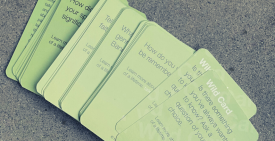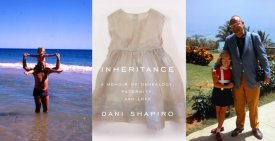Modern Loss contributor Megan Devine leads a 30-day “Writing Your Grief” course through her website, Refuge In Grief. Every week, over the course of a month, participants receive a different email prompt — each designed to facilitate writing on different aspect of grief. Devine is intent on helping students balance the craft of writing with the reality that what they’re writing isn’t just any story. Devine, a trained therapist, knows this from experience: Her partner drowned on an otherwise ordinary summer day five years ago. (She wrote about the aftermath on Modern Loss.)
Now a fulltime writer, speaker, teacher and grief advocate, Devine launched her online grief-writing course earlier this year. The course opens for a new session every six weeks. And good news: Modern Loss readers can get a discount on the course fee by typing “modernloss” (without quotation marks) in the coupon box on the registration page.
Devine spoke recently with Modern Loss about why she began the course, what students can expect to get out of it, and the resources available to them after the 30 days is up.
Whom is this class for? Is it appropriate for those at any stage of their grief journey?
If you identify as carrying grief, you are welcome to join the course. Participants in the group have a wide range of losses: children, parents, partners, friends. Most are grieving a death, but some are grieving other losses or changes in life due to illness, injury or circumstance.
No one is too far out from their loss to join. If you have grief to write from, you are welcome. One of the best things someone said to me soon after my partner died was: With something this big, “just happened” can mean 80 years ago as much as it means this morning.
If there are words inside you connected with love, loss and grief, this is a good place for you. Even if you don’t identify yourself as a writer.
What can participants expect to get out of the 30-day course?
First and foremost, you can expect to learn something about yourself — and I don’t mean that in a “you have things to learn” kind of way. I mean, every writer who has come through one of these courses discovers something about themselves, whether that is a bank of memories they thought they’d lost, or an aspect of love that becomes clear to them.
Being in a community of writers, all living deep loss, is a powerful experience. Different voices, different losses, all coming together to speak what is true for them — it’s one of the best things about this course.
The depth and connection that happens within the group from the very first day is stunning. What that tells me is that we need these spaces. We need places where we can write about the reality of grief without being corrected or judged or silenced before the words are even formed.
What prompted you to lead something like this?
I knew that at some point, I would be working with writers. I imagined it was quite a way off, as I’d been focused on building connections within the grieving community. And then, within the space of a week, three of my readers asked me to help them with their writing. Posts I’d written about the writing process were getting shared and discussed more heavily. It took about a month after those first inquiries to develop the course. Within the first 24 hours after opening the doors, I had 25 people enrolled. That first group had 46 writers. The course now runs roughly every six weeks, with many writers returning for a second and third time through. (The course fee is more than half off for returning students.)
After the 30-days is up, participants can take part in an ongoing writers’ forum. Explain what that is and what kinds of support they can expect to get there.
The ongoing members’ community is housed within the Refuge in Grief site, and is only available to people who have been through at least one round of the “Writing Your Grief” course. I send out a new writing prompt each week, but the really cool stuff happens within the community forums — the support and nourishment that begins inside the 30-day course continues inside that community space. People share their writing, and discuss what’s going on in their lives, both directly grief-related and tangentially so.
I consider the members of the online space my special tribe. I’m always on the look-out for things that encourage their writing, and I’m constantly pushing my own tech-learning curve in order to make the community space more vibrant and useful.
One super neat thing inside the members’ space is the section on calls-to-action. Some, though not all, of the writers inside the community are interested in sharing their words with the wider world. I want to do what I can to encourage and nurture that. I’ll be starting a new series inside the online community on the basics of crafting a pitch, how to develop your platform, and where to find the people who need your words most. I love this. It’s not something I saw happening a few months ago, and I’m beyond happy to be doing it. You don’t have to be interested in sharing your writing, but some people do discover that in themselves through the 30-day course.
Megan Devine is the author of the audiobook “Everything is Not Okay: Practical Tools to Help You Stay in Your Heart & Not Lose Your Mind,” available on her website. You can find her on The Huffington Post, The Manifest-Station, Open to Hope, and Modern Loss. Please be sure to sign-up for her weekly letter by clicking on the newsletter link alongside every “Refuge in Grief” blog post.









